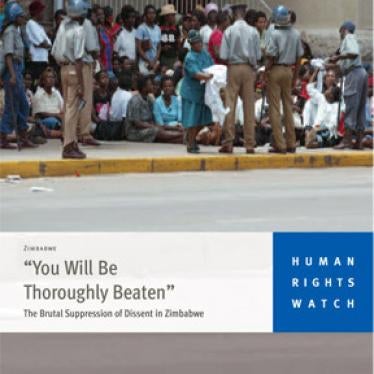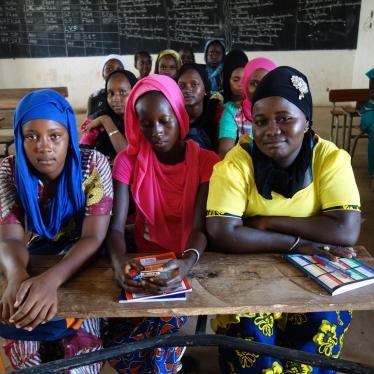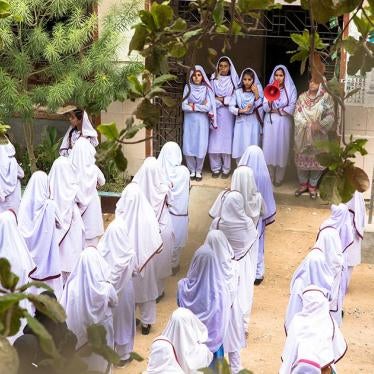In reaction to a recent wave of protests against deteriorating social and economic conditions in the country, the Zimbabwean government has intensified its campaign to suppress peaceful dissent, Human Rights Watch said in a report released today.
The 28-page report, “‘You Will Be Thoroughly Beaten’: The Brutal Suppression of Dissent in Zimbabwe,” reveals the repressive tactics that the government has used against civil society activists in the past year. Human Rights Watch has documented systematic abuses against activists, including excessive use of force by police during protests, arbitrary arrests and detention, and the use of torture and mistreatment by police and intelligence officials.
“When Zimbabweans engage in peaceful protest, the government responds with brutal repression,” said Georgette Gagnon, deputy Africa director at Human Rights Watch. “The authorities use torture, arbitrary arrest and detention to deter activists from engaging in their right to freely assemble and express their views.”
Political, social and economic conditions in Zimbabwe have deteriorated considerably in recent years. Civil society organizations have increasingly expressed concerns at the worsening conditions by engaging in peaceful protests and demonstrations. The government’s response has been heavy-handed and brutal. Police have violently disrupted peaceful protests by beating demonstrators with batons and in some cases rifle butts.
On September 25, for example, police violently disrupted a peaceful march by some 500 activists from the National Constitutional Assembly in Harare. Riot police armed with batons stopped the march, asked the activists to sit down, and proceeded to beat them one at a time with batons before ordering them to leave. During the beatings, a number of people panicked, which led to a stampede that injured about 24 people, seven of them seriously.
Police have also used laws such as the Public Order and Security Act and the Miscellaneous Offences Act to justify the arbitrary arrest and detention of hundreds of civil society activists around the country. After arrest, most of the activists are released within hours, but some are held for days, often without charge. Others are brought before the judicial authorities to answer charges that, in many cases, are dismissed by the courts.
Civil society activists who had been detained told Human Rights Watch that they were often held in overcrowded and filthy conditions, with human waste on the floor and blankets infested with lice. The activists have sometimes been denied legal counsel and access to food, water and needed medical assistance.
Human Rights Watch also documented acts of police torture and mistreatment of activists while in detention. Police have subjected detainees to severe beatings that involve punching, kicking and striking with batons, beatings on the soles of the feet, repeated banging of detainees’ heads against walls, and shackling in painful positions. Civil society activists told Human Rights Watch that police and intelligence officers interrogated them during these beatings, and then accused them of belonging to the opposition and trying to overthrow the government.
“During interrogation, they beat me with baton sticks, clenched fists and kept kicking me,” a student activist told Human Rights Watch. “I was being beaten every night. Every night they would threaten me and say, ‘We will kill you tonight.”
“Each night they would come and they would strip me naked and then handcuff me with my hands between my legs so that I would not be able to move while they beat me,” said the activist, who was detained for four days in May by police in the northeastern town of Bindura. “Sometimes they would be three people beating me, then two, or at times four. I was being accused of trying to facilitate regime change and working for the opposition.”
The report also highlights the brutal police assault of 15 trade unionists from the Zimbabwe Congress of Trade Unions at Matapi police station in Harare on September 13 after they participated in peaceful demonstrations to protest poor working conditions and the deteriorating economic situation. At the police station, a group of five police officers took the unionists in pairs to a room and proceeded to beat them with batons, and punch and kick them. The beatings, which lasted for between 15 and 20 minutes, were so severe that a number of the trade unionists lost consciousness. They sustained serious injuries ranging from fractured limbs to extensive bruising, deep cuts to the head, and perforated eardrums.
“The police torture and mistreatment of civil society activists is not only deeply disturbing; it’s illegal under Zimbabwean as well as international law,” Gagnon said. “The government must immediately investigate these abuses and bring those responsible to justice.”
Police and intelligence officers also routinely target human rights lawyers and activists who try to expose abuses of human rights in an effort to prevent them from doing their work. The lawyers and activists are subjected to sustained harassment and intimidation in the form of verbal attacks in the state-run media, and death threats over the phone by people purporting to work for the government.
The Zimbabwean government has an obligation to respect basic freedoms and human rights under both domestic and international law. These rights include the rights to freedom of expression, association and assembly, and the right to be free from torture and cruel, inhuman or degrading treatment.
Human Rights Watch called upon the government of Zimbabwe to end the practice of arbitrary arrests and detentions, and to stop the use of excessive force by the police. The government should also investigate all allegations of torture and cruel, inhuman or degrading treatment, and bring the perpetrators to justice, Human Rights Watch said.







